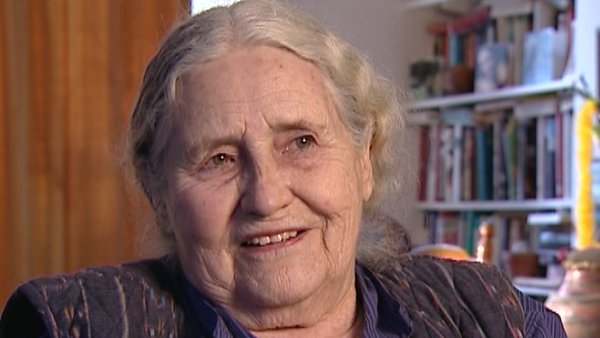NEXT STORY

When idealism encountered colonial traditions
RELATED STORIES

NEXT STORY

When idealism encountered colonial traditions
RELATED STORIES


|
Views | Duration | |
|---|---|---|---|
| 1. Let's write a novel! | 2 | 4276 | 04:17 |
| 2. White mistresses and menservants | 1 | 903 | 04:19 |
| 3. The Grass is Singing | 968 | 02:41 | |
| 4. When idealism encountered colonial traditions | 1 | 732 | 03:30 |
| 5. In search of a publisher | 1 | 480 | 04:51 |
| 6. 'Cry, The Beloved Country' paves the way for 'The Grass is... | 1 | 494 | 02:17 |
| 7. Poverty, Indian restaurants and the Great Unmentionable | 605 | 05:28 | |
| 8. The lamentable gap between writers and academics | 618 | 05:06 | |
| 9. The Fifth Child | 1315 | 02:48 | |
| 10. Who are the little people? | 812 | 04:14 |

I have to mention them before The Grass is Singing – I wrote two books. I was then working as a... what we now call an au pair, but... which sounds... now au pair was then called working as a nursemaid... I was working as a nursemaid in Salisbury, and I went home to the farm and I wrote two novels.
One was... I certainly learnt a lesson with that. It was written in longhand, very fast, and I could never read it back, so I was obviously inspired by something. But the other one, you see, was a... something I was not equipped to write... I was making fun of the white culture which, believe me, could be made fun of, it was so appalling, but I didn't have the experience to write it, I couldn't write it, I didn't know how to. So I wrote this novel, which was very mannered; I don't know where the authority came from or what book I'd read before that enabled me to write a very mannered book about white society in Salisbury, Southern Rhodesia, but it was terrible. And I'm glad to say I tore both of them up at once, which goes to show I had some sense, even then.
So then time passed, and then I had to write another book, and that was The Grass is Singing. And so there I had this newspaper cutting and a lot of knowledge about that culture. So I have... this had a very long history, The Grass is Singing. One part of it was... a quite short part of it... was to do with the white assistant on the farm, and he observed what was going on with the Turners, but the rest of it was an immensely long book which would have been very good if I'd been equipped to write it. In those days, you see, there were... the white assistants came out from England. They were... because of the slump – which one should never forget – this was the '30s... everyone was unemployed, and I mean, there was the most dreadful poverty here in... among the working classes – a phrase that seems to have disappeared – the most dreadful poverty. And there was no work for anyone; there was nothing.
British writer Doris Lessing (1919-2013) was awarded the 2007 Nobel Prize in Literature. Her novels include 'The Grass is Singing', 'The Golden Notebook', and five novels collectively known as 'Canopus in Argos'. She was described by the Swedish Academy as 'that epicist of the female experience, who with scepticism, fire and visionary power has subjected a divided civilisation to scrutiny'. Lessing was the 11th woman and the oldest ever person to receive the Nobel Prize in Literature.
Title: "The Grass is Singing"
Listeners: Christopher Sykes
Christopher Sykes is an independent documentary producer who has made a number of films about science and scientists for BBC TV, Channel Four, and PBS.
Tags: The Grass is Singing, Salisbury, Southern Rhodesia, England, 1930s, Mary Turner, Dick Turner
Duration: 2 minutes, 41 seconds
Date story recorded: June 2007
Date story went live: 21 October 2011